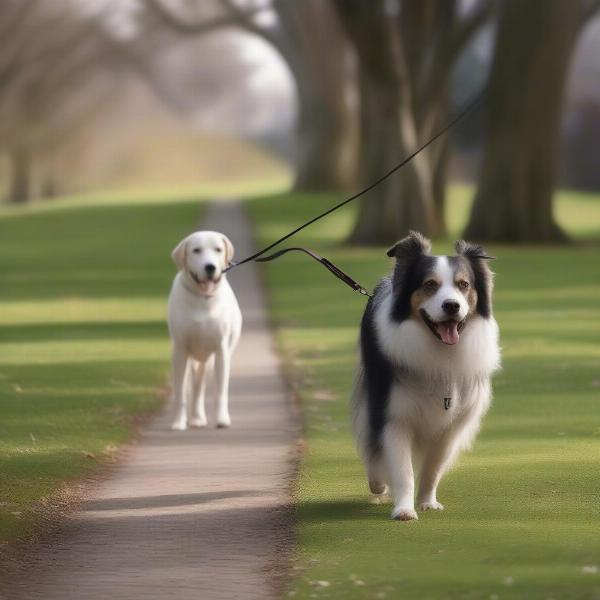Rejensa, often misspelled as “rejensa,” is not a recognized term in the canine world. This article will address the likely intent behind this search query, assuming it relates to “regeneration” or “rejuvenation” for dogs, and explore ways to support their overall health and well-being through proper nutrition, exercise, and veterinary care. We’ll cover topics like joint health, senior dog care, and recovery from illness or injury, aiming to provide practical advice for dog owners seeking to enhance their canine companions’ vitality.
Many dog owners search for ways to improve their dog’s health and help them recover from injuries or age-related decline. While there’s no magic “rejensa” solution, providing the right care can significantly improve a dog’s quality of life at any age. This involves understanding their specific needs and tailoring their diet, exercise regime, and preventative care accordingly.
Supporting Joint Health in Dogs
Joint problems are common in dogs, especially as they age. Maintaining healthy joints is crucial for mobility and overall comfort. A balanced diet rich in essential fatty acids like Omega-3s can help reduce inflammation.
- Omega-3 fatty acids: Found in fish oil and flaxseed, these can alleviate joint pain and stiffness.
- Glucosamine and chondroitin: These supplements support cartilage health and can improve joint function.
- Maintaining a healthy weight: Excess weight puts extra stress on joints. Regular exercise and portion control are essential.
Senior Dog Care and Rejuvenation
As dogs enter their senior years, they require specialized care to maintain their health and vitality. Regular vet check-ups become even more important for early detection of age-related conditions.
- Adapted exercise: Senior dogs still need exercise, but it should be gentler and less strenuous. Short walks, swimming, and gentle play are good options.
- Dietary adjustments: Senior dog food is formulated to meet the changing nutritional needs of older dogs, often containing higher levels of antioxidants and joint-supporting ingredients.
- Cognitive stimulation: Keeping senior dogs mentally engaged can help prevent cognitive decline. Puzzle toys, training, and social interaction are beneficial.
 Senior Dog Enjoying Gentle Exercise
Senior Dog Enjoying Gentle Exercise
Recovery from Illness or Injury
Supporting your dog’s recovery after illness or injury requires careful attention to their specific needs. Always follow your veterinarian’s instructions regarding medication, rest, and rehabilitation.
- Pain management: Managing pain effectively is essential for a comfortable recovery. Your vet can prescribe appropriate pain medication.
- Nutritional support: A nutritious diet can help boost the immune system and promote healing.
- Physical therapy: In some cases, physical therapy can aid recovery and restore mobility after injury or surgery.
Promoting Overall Well-being in Dogs
Dr. Emily Carter, a veterinary specialist in canine rehabilitation, emphasizes, “A proactive approach to your dog’s health, focusing on prevention and early intervention, can significantly enhance their quality of life.” This includes regular vet checkups, a balanced diet, appropriate exercise, and mental stimulation.
Dr. Carter also adds, “Understanding your dog’s individual needs is key. Factors like breed, age, and activity level all influence their optimal care plan.” This personalized approach is crucial for ensuring their well-being.
Conclusion
While “rejensa” may not be a real term, the desire behind the search is understandable. Focusing on proper nutrition, exercise, and veterinary care can help your dog thrive at every stage of life. By understanding your dog’s unique needs and providing proactive care, you can support their overall health, mobility, and happiness. Remember to consult with your veterinarian for personalized advice and guidance tailored to your dog’s specific needs.
FAQ
- What is the best way to support my dog’s joint health? A combination of a balanced diet, appropriate exercise, and supplements like glucosamine and chondroitin can help maintain healthy joints.
- How can I help my senior dog stay active and healthy? Adapt their exercise routine to their age and abilities, provide a senior-specific diet, and offer plenty of mental stimulation.
- What should I do if my dog is injured? Seek immediate veterinary care and follow their instructions for recovery, including pain management, nutrition, and physical therapy if needed.
- How often should I take my dog to the vet? Annual checkups are recommended for most adult dogs, and more frequent visits may be necessary for seniors or dogs with health issues.
- What is the best type of food for my dog? Consult your vet to determine the best diet for your dog’s breed, age, and activity level.
- How can I tell if my dog is in pain? Signs of pain in dogs can include changes in behavior, such as limping, whining, reduced appetite, or reluctance to move.
- How can I keep my dog mentally stimulated? Puzzle toys, training sessions, and social interaction are great ways to keep your dog’s mind active.
Related Articles on ILM Dog
(No related articles found.)
About ILM Dog
ILM Dog (https://ilmdog.com) is your trusted international resource for all things dog-related. We offer expert advice on dog breeds, health and wellness, training, nutrition, grooming, and more. Whether you’re a seasoned dog owner or just starting your journey, ILM Dog provides the information you need to ensure your canine companion lives a long, healthy, and happy life. Contact us for personalized support: Email: [email protected], Phone: +44 20-3965-8624.